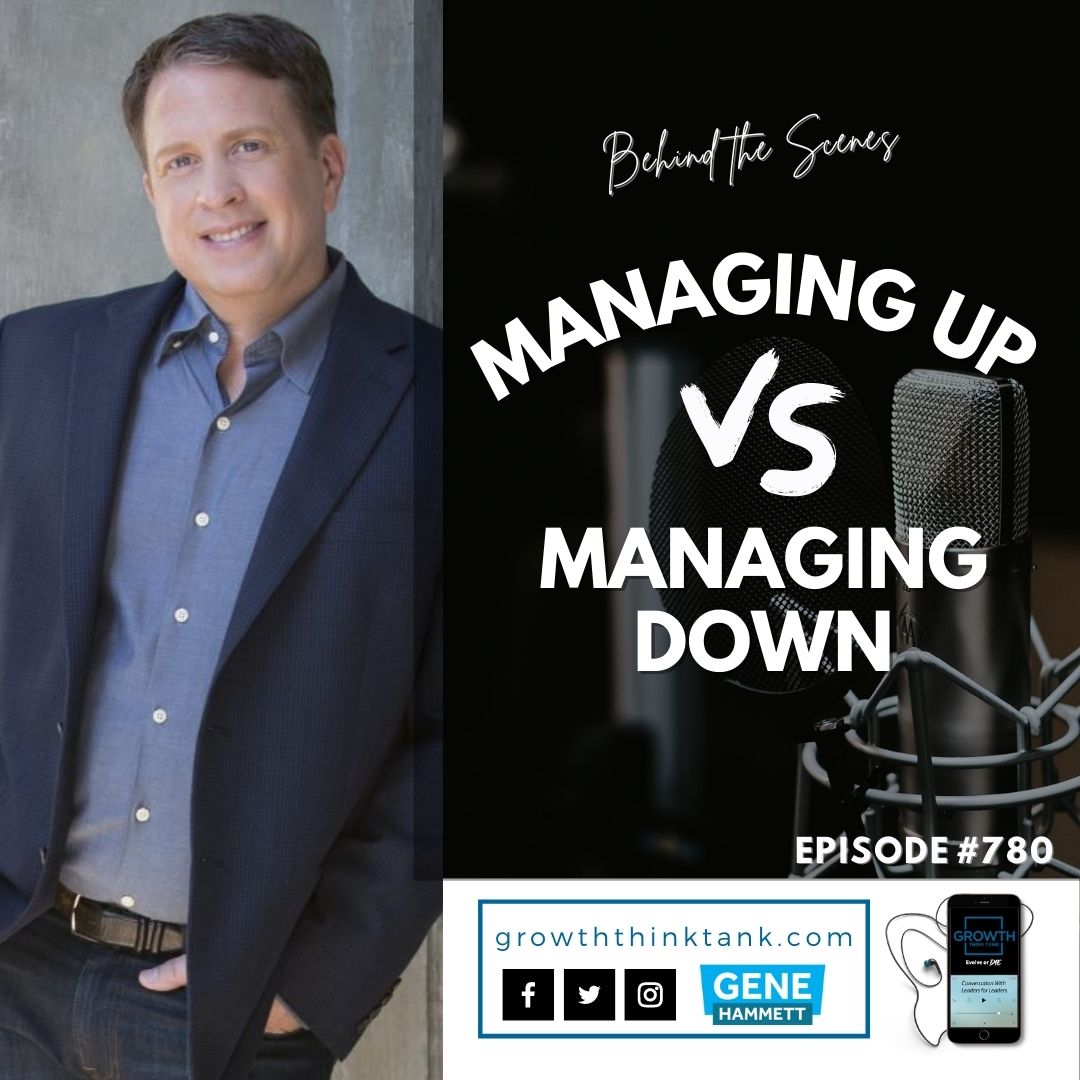Managing Up vs Managing Down – Behind the Scenes
Managing down has been the most typical approach to leadership over the last century and beyond. Managing down is based on authority, power, and even fear. Telling your people what to do is one behavior of managing down. Today, we look at managing up. In organizations where people are empowered and take ownership of their work, managing up makes that happen. In this episode, you will get new perspectives on the power of managing up that is common for fast-growth companies.
Don't miss an episode. Subscribe to Growth Think Tank.
Behind the Scenes: The Transcript
Share the LOVE and TWEET about this episode.
Disclaimer: This transcript was created using YouTube’s translator tool and that may mean that some of the words, grammar, and typos come from a misinterpretation of the video.
Recently, I asked the clients, do you manage up or manage down? His first response is, well, of course, I manage down the organization. I’m the CEO of the company. Now, this is a common approach to leadership. This is a common way for us to get things done. We delegate down to our executive team. They delegate down to the directors, the managers to the frontline employee.
[00:00:28] And that’s how we serve and get things done. Now, this has been around for decades, if not a century or more, and even beyond that, managing down is very common managing up. Is a new phenomenon in the way of leading and engaging people managing up is sort of like servant leadership? If you will, where the pyramid is reversed, where you serve your executive team, the executive team serves the directors, the directors served the managers, the managers serve all the frontline employees and they serve the customers and the customers are at the top front and center of the organization.
[00:01:11] Now that may sound really good. But are you really managing up or are you managing down? If you have a tendency to make decisions, if you have a tendency to tell people how to do things, if you have a tendency to get in the valve and the process, then you’re probably managing down more than you realize.
[00:01:31] What does it look like when you’re managing up? The behaviors that you have on a day-to-day basis are different than managing. Yeah. One of them is you let people make decisions instead of you deciding what’s next, how to do it, you let others do it. The second is you’re finding ways to empower them.
[00:01:52] You’re removing the roadblocks that get in their way, whether it be in their head where they’re not, they’re afraid to do something, or that you are removing physical roadblocks. Sometimes as you work to smooth out relationships. Now I do encourage you. If you do this too much, they’ll re rely on you to do it.
[00:02:11] But sometimes you’ve got to remove the friction inside of organizations and that’s part of managing up. And the third behavior is really about you coaching them. So instead of you solving their problems for them, you coach them through the problems. You ask questions, you allow them to make. Now, this is something that has to be done proactively, not just, you know, in the response to some triggered event, but you have to do this on a day-to-day basis.
[00:02:39] I share all this with you because I want to make sure that you are an extraordinary leader. Our mission here at the growth think tank is to change the world to extraordinary leadership. And the thing that we do is create content to help you rethink leaders. Managing down is very common and it works short-term, managing up is what I see most of the time inside of organizations.
[00:03:03] They may not have the words for it. Sometimes they call it servant leadership. Managing up in the organization looks very different. You show up differently, the employees show up differently and it takes both sides. All of this to say, hopefully, you’re learning that managing up has a powerful force inside of you, right?
[00:03:22] It allows growth. It allows impact and allows personal development across the organization. I share all this with you because I love to help you grow your company. I love to help you grow yourself, become an extraordinary leader, and help your teams align together to the goals and the challenges in front of them.
[00:03:41] All of this is to help you be the leader that your team deserves. When you think about anything to do with growth or leadership, think of growth thinking. And you think of me, think of me as the executive coach to help you get what you want out of your business, out of your professional life. I want to help you create a place that you don’t have to retire from that you love the work that you’re doing.
[00:04:04] You’re no longer babysitting adults and you are truly leading a company to extraordinary Heights and so much fun doing it, all this to be said. When you think of leadership, think of me and think of growth. As always lead with courage. We’ll see you next time.
Disclaimer: This transcript was created using YouTube’s translator tool and that may mean that some of the words, grammar, and typos come from a misinterpretation of the video.

Resources
A QUICK FAVOR
And lastly, please leave a rating and review for the Growth Think Tank on iTunes (or Stitcher) – it will help us in many ways, but it also inspires us to keep doing what we are doing here. Thank you in advance!
If you want more from us check out more interviews:
Transformational Leadership Productivity Tips Best Selling Author Interviews
Podcast: Play in new window | Download
Subscribe: Apple Podcasts | https://www.youtube.com/user/leadersinthetrenches


